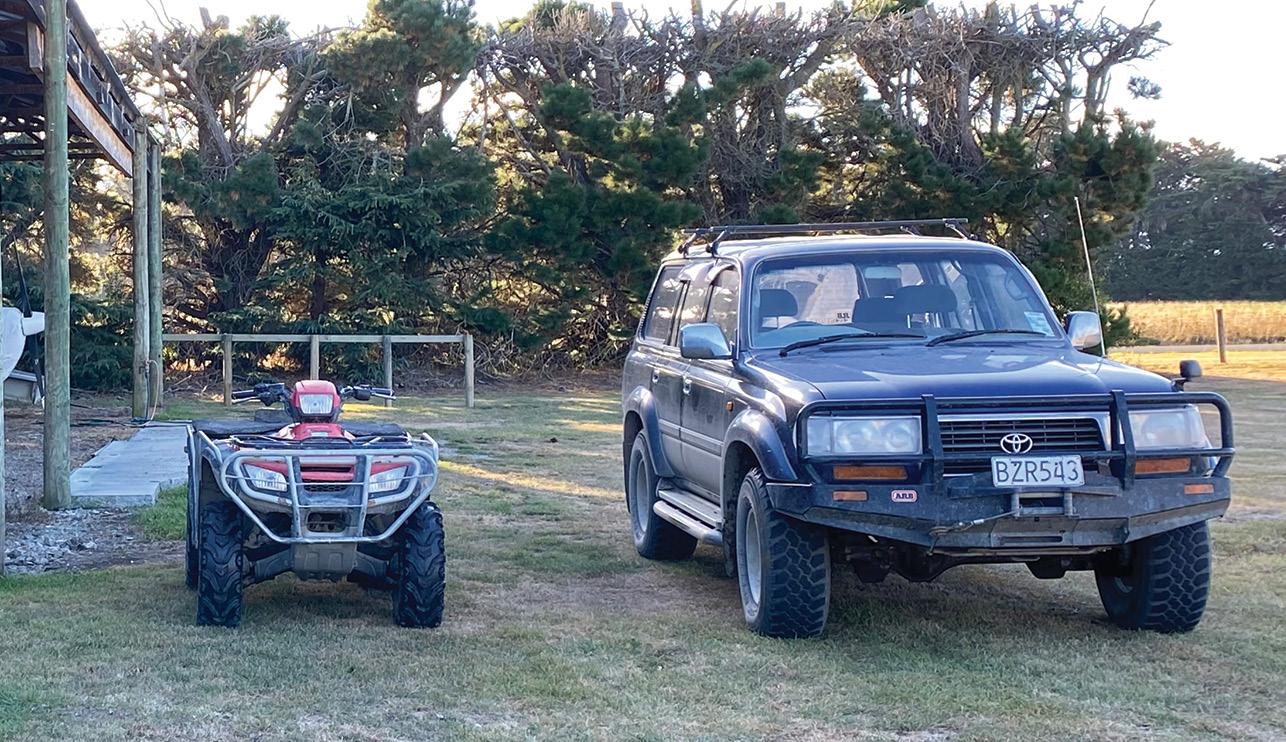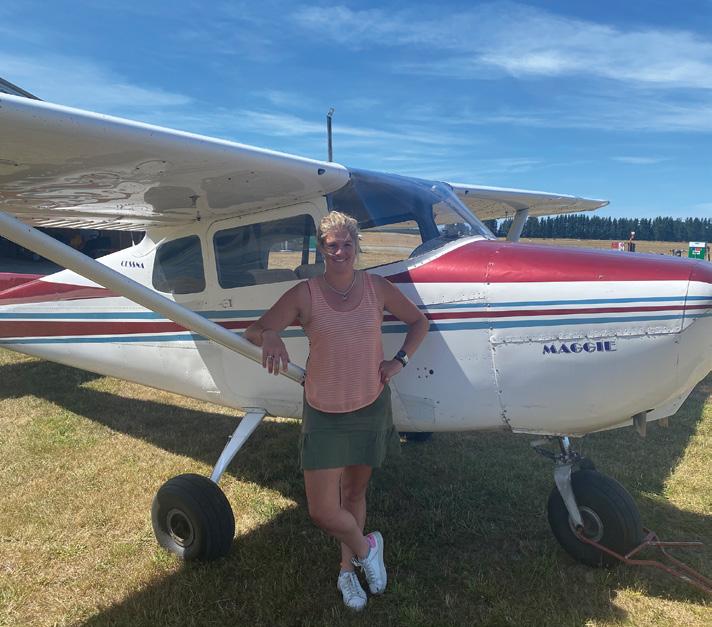
7 minute read
Harriet Bremner asks why we do safety checks for planes but not other vehicles
WELLBEING SAFETY CHECKING
Harriet Bremner and Poppy. Why do preflight cheeks on airplanes...but not on these farm vehicles?


A question of perception….
Harriet Bremner asks why we do plenty of safety checks for planes but not other vehicles we use.
Back in December the old man sat me down and said “Right, are you going to do your license or not?”. He was referring to my pilot’s license, a quiet dream of mine that had been burbling away at me for years, while sitting in the right-hand seat beside the pilot.
In my early 20’s, flying became a part of getting around places with James, and I vividly remember helping him study all those exams with hundreds of cue cards to learn. He was an excellent pilot, a natural, and I always felt extremely safe with him in charge of the lefthand seat. He encouraged dad to follow his dream of flying too and gave him a voucher for Christmas one year and as they say, the rest is history. Hours of flying chat over the phone combined with fly-ins and adventures, it was a pretty cool thing that they did together.
Before every flight occurred, there was always the routine of pre-flight checks from the structure of the plane to fuel, oil and engine checks and more. We simply never got in the plane without these occurring. Part of the culture ingrained in flying is that you must always thoroughly check your plane before taking off – no one likes an engine failure at the best of times, let alone when you are 100ft off the ground after taking off.
It is never questioned, the pre-flight checks. I have never heard a pilot complain or mock the fact that you have to do all of these things every single time that you fly because we know that flying comes with risk. So, we take the steps to ensure that everything is good to go before we turn the key. It is a behavior that is ingrained in flying and you wouldn’t question these checks because it makes sense to do them, so you can stay safe.
As important as the pre-flight checks are in flying there is another huge factor that results in most light aircraft accidents and that is human factors. Human factors is a subject that focuses on the aspects of being human, such as our ability to process information, make decisions, communicate and adapt to situations, that either help or hinder people from performing their jobs safely.
While I was studying for this particular exam, it was mind blowing to think how relevant human factors are to farming, with the decisions we have to make and the gear that has to be driven while on a range of terrain, coupled with the everyday stresses of life.
I have learnt very quickly that if there is something happening that is causing me extra stress or anxiety that it affects my flying. Things that are going on in our lives have huge impacts and every week my instructor chats to me about what has been going on in my life to ensure that I am ‘fit to fly’ on that particular day. It could be that you are stressed because of things happening at work or someone nearly drove into you causing an accident on the way to your lesson or you are simply tired and strung out, in need of a week of good sleep and some down time. People talk about this stuff all the time in flying, the external effects from life and how it impacts your ability to perform to the best of your ability.
The plane can be in tip top shape but if your mind is not then you are putting yourself at risk.
APPLYING FLIGHT SAFETY TO FARMING
So, why a plane and not a motorbike, truck, side by side or tractor? Is this a question about perception? We perceive flying to be dangerous, so yes of course it makes sense to do pre-flight checks and be on your game mentally before you take off but why do we perceive the things we do onfarm as being any less dangerous? Is the end result of a bad or marginal decision not the same regardless of what we are driving/flying?
I know that people will say, ‘but the plane is leaving the ground, making it more dangerous’. I will then argue that because of the behaviors built into the flying community, you ensure that you are making the best decision before you fly whereas with farming, ‘it just has to be done’ so you jump in the truck and hoon off, not thinking about the fact that there has been an inch of rain and that clay track could prove lethal on this particular day.
I have heard many a conversation when pilots share their experiences when it comes to the conditions and they made a decision to stay put and not fly on that particular day or they drive instead. We need to ensure that we are picking the right vehicle for the job, even if it means walking.
When was the last time that you checked the structural integrity of your vehicles onfarm? Are they up to date with their services and warrants? Do the brakes work properly? Have you checked in on your staff and asked them if they are ok?
The current mental state of staff could well be the nail in the coffin if they aren’t fit for driving on the side of that hill today. These conversations and checks are so important and could be lifesaving for someone that you care about. Give them the chance to be honest with you, these are the life-saving conversations we need to be having with each other every single day.
You wouldn’t let someone fly a plane if they were mentally not in the right headspace, nor would you get in the plane if a seatbelt was broken or the pilot had been drinking… so I ask; why do we believe it is OK to do these things when it comes to other vehicles?
We put things, like seatbelts, in place to protect us should the worst-case scenario occur, not because we expect or want it to. A decision like popping your helmet on can be the difference between you being here next week or not but also, deciding you need some help, downtime, sleep or a holiday so you can make better, safer decisions, is also lifesaving.
So, when you are out on the farm and about to start a high-risk job; stop, think and ask yourself… am I fit to farm?
Flying VS Farming:
Midday to mid-afternoon is most common for accidents and on Friday or Saturday where fatigue at the end of the day and week is believed to be a contributing factor.
Data showed risk of being involved in an accident increased with age – most high risk between 55-64 years of age. Farmers are 20 times more likely to be killed or maimed at work than people in other sectors.
25% of all deaths on farms are people in their 60’s. Nearly 90% of those are due to vehicles.
The more up-to-date a pilot is, the less likely they are to have an accident.
Determined that flying accidents are linked to inappropriate decisions and control inputs.
Competency and currency were identified as key safety indicators.
Agricultural and private pilots most likely to have a fatal crash or an accident. Despite the increase in experience that comes with age, farmers aged in their 60s and over the age of 70 die in the highest numbers onfarm. This is at odds with the perception that with more experience comes better risk assessment and improved health and safety.
It has been proven that we make different decisions at 3pm than we do at 8am. Fatigue is a factor among many farm accidents.
Quad bike or tractor: by the time a farmer is reaching the age of 60 or 70+ his experience on the machine and potentially the land should be at its peak. Yet they still find themselves suffering the highest amount of fatal harm at this stage in their careers.
Vehicles are the main cause of deaths on farms; four wheelers being number one, followed by tractors.
As we can see, decision making is a key contributing factor to both farming and flying alike.Just because someone has experience under their belt, doesn’t mean they are not at risk of having an accident. It can be the thing that you do all the time that gets you. Fatigue, complacency, rushing, mental health and more are all factors that contribute towards a bad decision being made in a moment.









